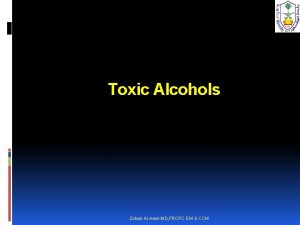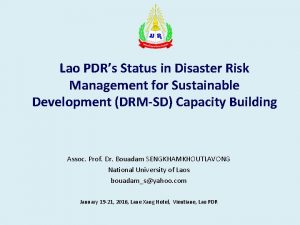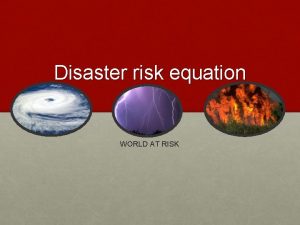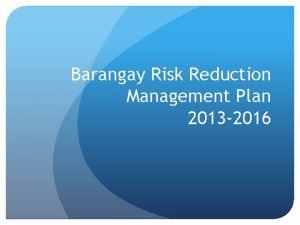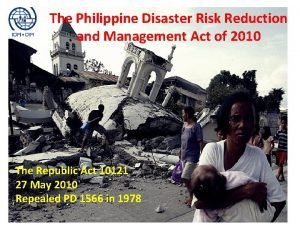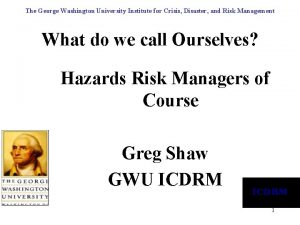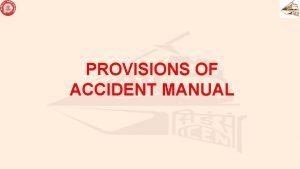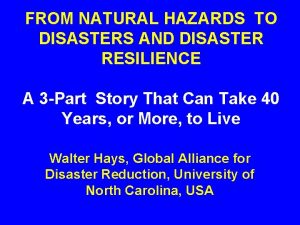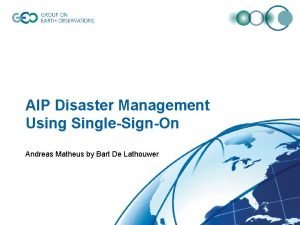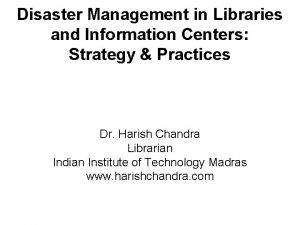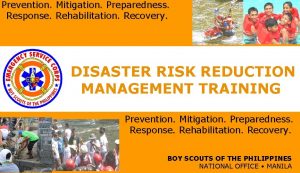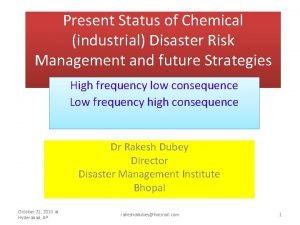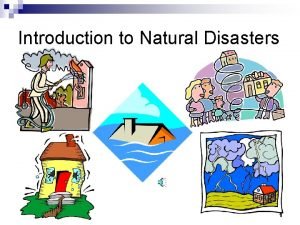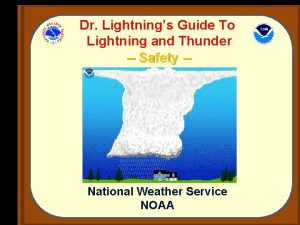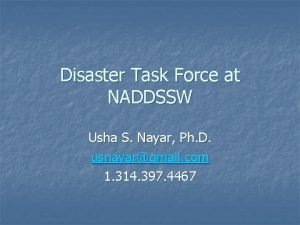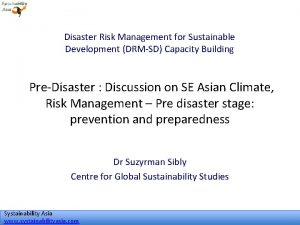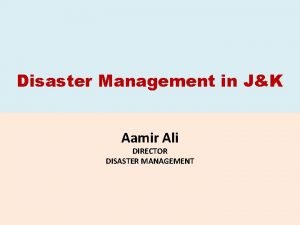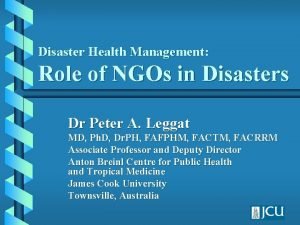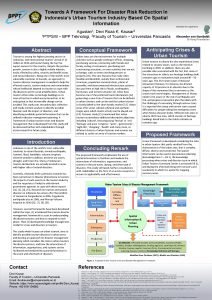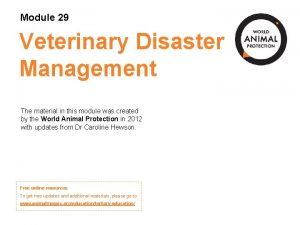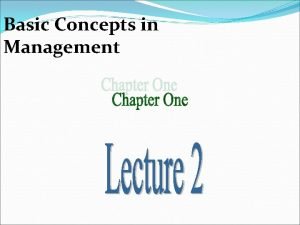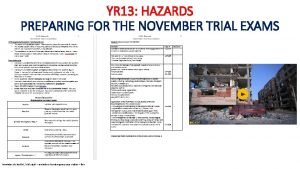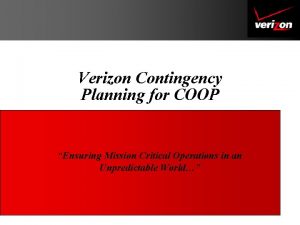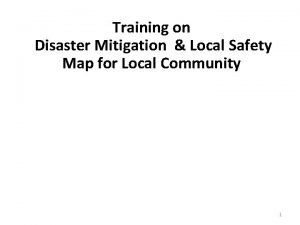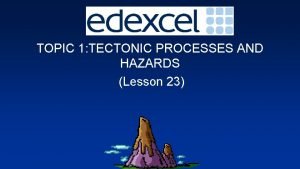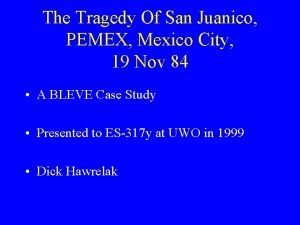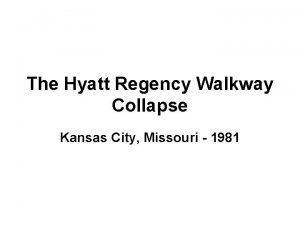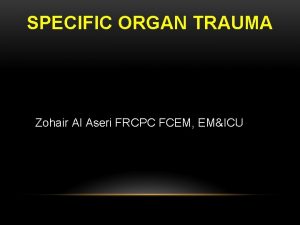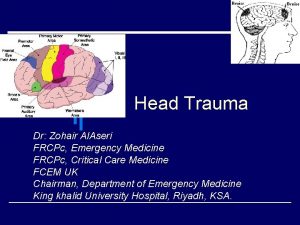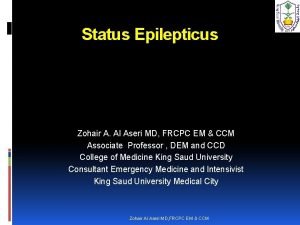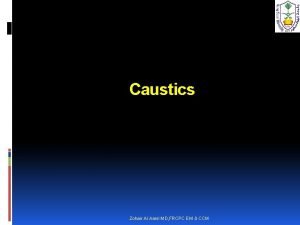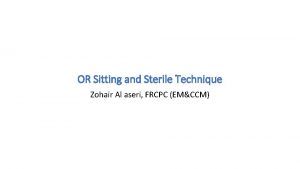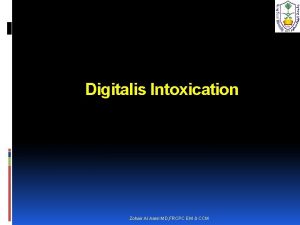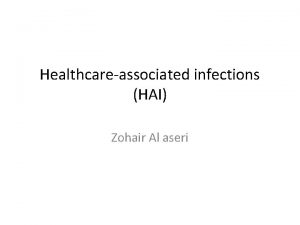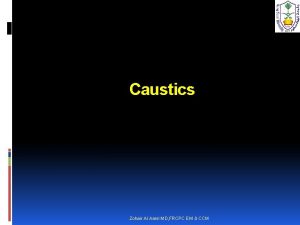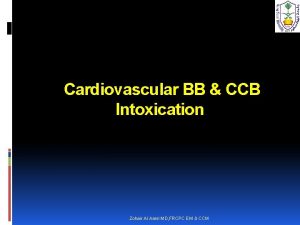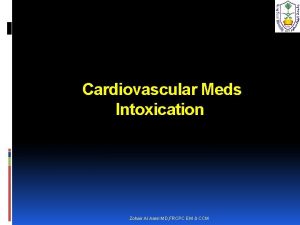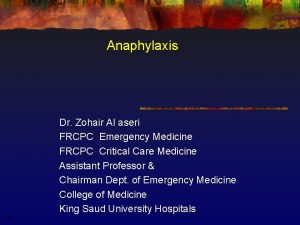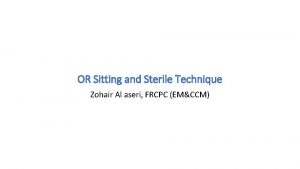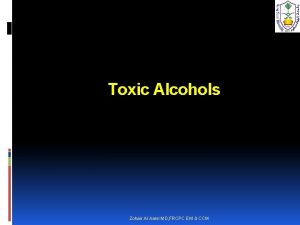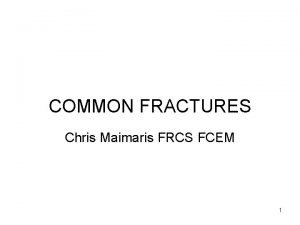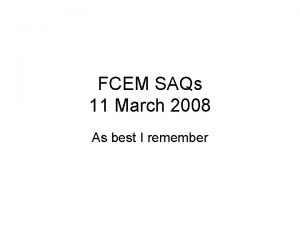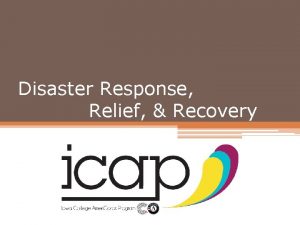Disaster Management KSUMC Zohair Al Aseri MD FCEM











































- Slides: 43

Disaster Management KSUMC Zohair Al Aseri. MD, FCEM (UK). FRCPC (EM&CCM). Consultant, Departments of Emergency Medicine & Critical Care. Chairman, Department of Emergency Medicine Director, Disaster Management Master Program. College of Medicine King Saud University Hospitals. Riyadh, KSA Email: zalaseri@ksu. edu. sa Fax: +966(11)467 -2529 Tel: +966(11)467 -0544

Definition of a Medical Disaster When the destructive effects of a natural or manmade forces overwhelm the ability of a given area or community to meet the demands for health care

Hospital Emergency Incident Command System (HEICS) & Emergency (Disaster) Operations Plan (EOP) serve as an important emergency management foundation for our institute.

Basic Features of ICS • • Common terminology Modular organization Management by objectives Reliance on an Incident Action Plan (IAP) Chain of command unity of command Unified Command Manageable span of control

ICS Management Organization • Management system not an organizational chart • The ICS organization does NOT correlate to the administrative structure of the agency • Normal roles may not be assumed in ICS

ICS Management Functions INCIDENT COMMANDER LIAISON OFFICER SAFETY OFFICER PUBLIC INFORMATION OFFICER OPERATIONS SECTION PLANNING SECTION LOGISTICS SECTION FINANCE/ADMIN. SECTION

Emergency (Disaster) Operations Plan (EOP) Intended to explain in a clear and concise manner the critical components HICS as well as the suggested manner for using the accompanying materials.

Two types of emergencies that may impact on this hospital • Internal Emergencies involve only the hospital and its capabilities that may be reduced. • External Emergencies will usually be sited outside the hospital and the hospital’s capabilities may remain intact.

Basic components of EOP: 1)Mitigation: find ways to reduce the devastating effects of disaster BEFORE it occurs. 2)Preparedness / Planning 3)Response 4)Recovery / Debriefing

3 temporal phases of injury event –Prevent –Event –Post event

Description of Disaster • PICE- Potential Injury Creating Event

PICE- Prefixes A B C Static Controlled Local Dynamic Disruptive Regional Paralytic National International

PICE Stage 0 Need for Status of outside help None Inactive I Small Alert II Medium Standby III Large Dispatch

CTAS Triage level I Time to MD Imm 15 30 60 120 ediat min min e 98% 95% 90% 85% 80% Fractile Response II IV V Admission Rate 7040 - 20 - 10 - 090% 70% 40% 20% 10%

Impact Zone Injured & non-injured victims Triage Zone Dead & Uninjured Treatment Transport Staging Area Hospital or Health Care Area


MOI 1. Primary Mechanisms 2. Secondary Mechanisms 3. Tertiary Mechanisms Forces Involved Examples Impact Acceleration Deceleration Crush Penetration Thermal Electrical Victim thrown into a wall by a tornado Blast wave in explosion Sudden stop in plane crash Victims trapped in collapsed structures Projectiles powered by wind, explosion Burns from fires after earthquake Lightning strikes in storm Asphyxiation Inhalation (i. e. toxins) Shock Exposure Metabolic Associated victim specific disorders Victims trapped in enclosed spaces After hazardous materials spill Secondary to trauma from 1° MOI Victims unable to access shelter Lack of fresh water Diabetics unable to access food or medications Nutrition Infection Renal failure Cancer Psychological Lack of access or spoiled food Untreated injuries, limited antibiotics Consequence of crush syndromes Consequences of radiation exposure Reaction to life-changing events



Basic components of EOP: In the Preparedness / Planning part Activation / Notification (when + how) Facility protection (especially for terrorism disasters) Decontamination Staging area Evacuation plans Families care Expansion of services and alternative care sites Supplies and Logistics Resources (Inventory of hospital resources) Personnel (Fan-out, methods of mobilization) Phone #, contacts, etc.

Basic components of EOP: In the Preparedness / Planning part Staff education and Training Exercises Command Control Incident Command System Incident Commander Operations Section with Subdivisions Planning Section (collect and disseminate infos) Logistic Section (provide materials) Finance Section Who does what. Structure. Chain of command. Coordination and Communication Media

Phases of Disaster Response 1. Activation 1. Notification 2. Organization of command post 2. Implementation 1. Search and rescue 2. Triage, stabilization and transport 3. Definitive management of scene hazards and victims 3. Recovery 1. Withdrawal from scene 2. Return to normal operations 3. Debriefing

HOSPITAL EMERGENCY STATUS Whenever the internal or external emergency plan is activated, the hospital will be considered to be in EMERGENCY STATUS with specific command responsibilities to facilitate resource allocation.


ICS Command Staff • The Command Staff include: – Public Information Officer – Safety Officer – Liaison Officer INCIDENT COMMANDER LIAISON OFFICER PUBLIC INFORMATION OFFICER SAFETY OFFICER

Transfer of Command • Moves the responsibility for incident command from one Incident Commander to another • Must include a transfer of command briefing – Oral – Written – Both oral and written











Direct Telephone Number 1) 467 1362 2) 467 1372 3) 469 1763 Fax 469 1764





Debrief At the conclusion of the event, a formal debrief and counseling sessions should be made available for all staff. The Psychiatry Department will coordinate this after the emergency is over.

Thank YOU ? ? ?
 Temos um motor eletrico de fcem 80v
Temos um motor eletrico de fcem 80v Zohair a serum
Zohair a serum Zohair serum
Zohair serum Conclusion in disaster management
Conclusion in disaster management Early warning system in disaster management
Early warning system in disaster management Disaster risk equation example
Disaster risk equation example Records management disaster recovery plan
Records management disaster recovery plan Disaster management definition
Disaster management definition Uwl mitigation
Uwl mitigation Civil defence disaster management
Civil defence disaster management Bdrrm plan message
Bdrrm plan message Aviation critical infrastructure
Aviation critical infrastructure Philippine disaster risk reduction and management system
Philippine disaster risk reduction and management system George washington crisis management
George washington crisis management Disaster management
Disaster management 4 pillars of disaster management
4 pillars of disaster management Disaster management conclusion
Disaster management conclusion Emerging trends in disaster mitigation
Emerging trends in disaster mitigation Disaster management in libraries and information centres
Disaster management in libraries and information centres Natural disasters conclusion for project
Natural disasters conclusion for project Republic act 10121
Republic act 10121 Hotmail
Hotmail Objective of disaster management
Objective of disaster management Natural disasters definition
Natural disasters definition Poster on disaster management with slogan
Poster on disaster management with slogan Conclusion of disaster management
Conclusion of disaster management Disaster management and sustainable development
Disaster management and sustainable development Nurse role in disaster management
Nurse role in disaster management Disaster management jk
Disaster management jk Ngo in disaster management
Ngo in disaster management 4 pillars of disaster management
4 pillars of disaster management Towards a framework for tourism disaster management
Towards a framework for tourism disaster management Veterinary disaster management
Veterinary disaster management Pyramid levels of management
Pyramid levels of management Management pyramid
Management pyramid Top level management
Top level management Disaster response curve park model
Disaster response curve park model Verizon 140 west street
Verizon 140 west street Two types of disaster
Two types of disaster Park disaster response model
Park disaster response model What does bleve stand for
What does bleve stand for Political impact of disaster slideshare
Political impact of disaster slideshare Hyatt regency in kansas city
Hyatt regency in kansas city Slidetodoc
Slidetodoc

